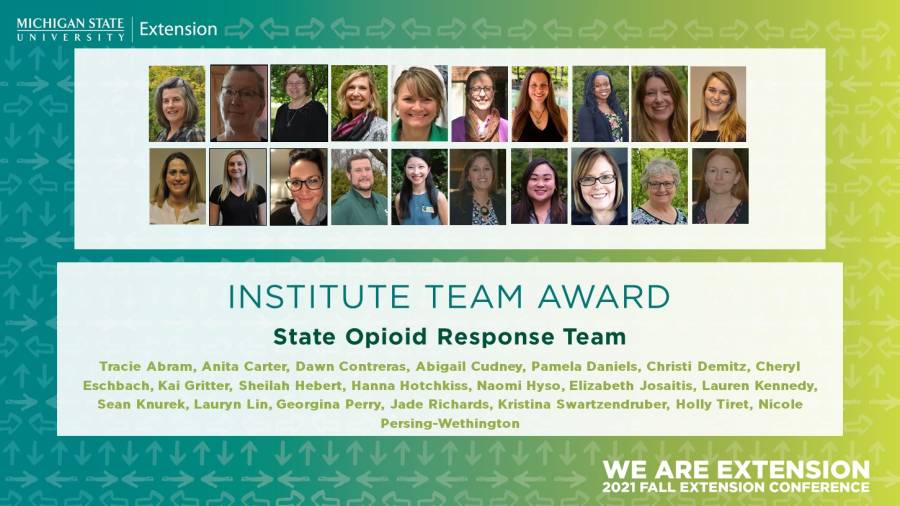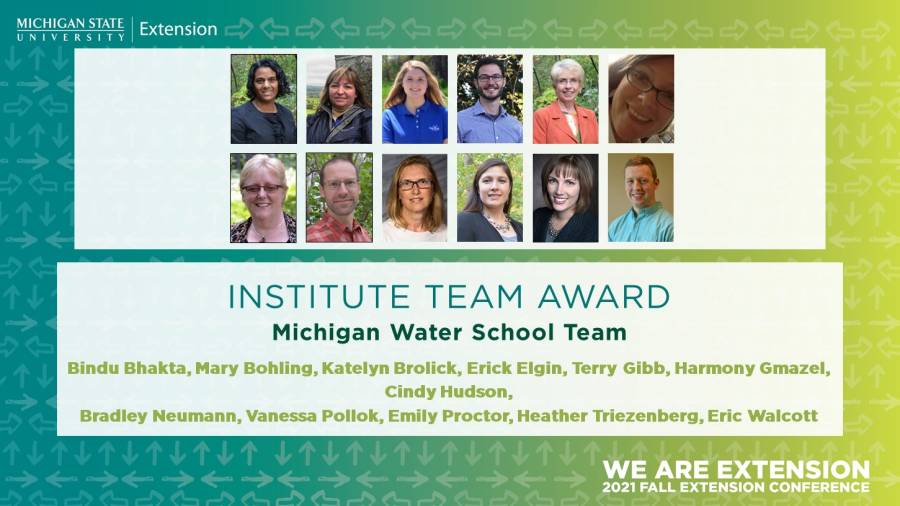State Opioid Response Team and Michigan Water School Team receive MSU Extension Institute Team Awards at Fall Extension Conference
State Opioid Response Team and Michigan Water School Team receive MSU Extension Institute Team Awards at Fall Extension Conference during the annual Fall Extension Conference held virtually on Sept. 28.
The Michigan State University Extension Institute Team Awards recognize outstanding team contributions to MSU Extension.

State Opioid Response Team receives Institute Award for their work in educating about opioids.
The team is made of Tracie Abram, Anita Carter, Dawn Contreras, Abigail Cudney, Pamela Daniels, Christi Demitz, Cheryl Eschbach, Kai Gritter, Sheilah Hebert, Hanna Hotchkiss, Naomi Hyso, Elizabeth Josaitis, Lauren Kennedy, Sean Knurek, Lauryn Lin, Georgina Perry, Jade Richards, Kristina Swartzendruber, Holly Tiret, and Nicole Persing-Wethington.
The State Opioid Response (SOR) team is a group of Michigan State University Extension health educators and program instructors led by senior Extension specialist Dawn Contreras. In 2018 and 2019, the SOR team received two grants totaling $391,104 to help prevent opioid misuse among Michigan’s older adults by educating them on nonpharmacological approaches to pain management. Over the past 2.5 years, a team of 20 staff within the Health and Nutrition Institute has provided educational programming to 2,860 older adults. Program participants developed their skill base and confidence in using self-management strategies to overcome pain and manage their chronic diseases. Example strategies included use of mindfulness techniques, medication management, and assertiveness and communications skills development. The project’s success allowed the team to receive a new $350,000 grant in 2020 to continue and expand opioid misuse prevention education to rural Michigan residents of all ages.
The SOR team collaborated extensively with the Michigan Department of Health and Human Services’ Office of Recovery-Oriented Systems of Care (OROSC) and the Prevention Networks who receive funding from OROSC. Prevention Networks helped promote the programs for older adults in their regions. Many Prevention Networks members became certified to implement the programs locally, helping to sustain the programming past the grant period. Prior to this initiative, no other entity in Michigan was providing opioid misuse education to older adults. OROSC reached out to MSU Extension to fulfill this need.
Participants received a locked medication box after completing the post-survey for the self-management classes. This item helped participants to keep opioids safe. The project uses three methods of delivering education: face-to-face, Zoom delivery, and mailed toolkit combined with conference calls. The impressive work of this team assisted older adults in feeling more confident and capable in managing their chronic pain.

Michigan Water School Team receives Institute Award for their work in assisting elected officials understand the water ways.
The team was made of Bindu Bhakta, Mary Bohling, Katelyn Brolick, Erick Elgin, Terry Gibb, Harmony Gmazel, Cindy Hudson, Bradley Neumann, Vanessa Pollok, Emily Proctor, Heather Triezenberg, and Eric Walcott.
Michigan State University Extension’s Michigan Water School: Essential Resources for Local Officials is an innovative program, modeled after a University of Florida initiative, and developed to help elected and appointed officials implement Michigan’s Water Resources Strategy. Many communities do not have capacity to educate local officials, and state legislators’ term limits make ongoing education about water resource issues necessary. The policy-neutral, fact-based program provides decision-makers with information, tools, and resources needed to understand water management. The Water School team developed the curriculum and additional resources through collaborations beginning in 2015. In 2017, a pilot program took place, and in 2018-19, four two-day in-person workshops were held around the state. In 2020, plans underway to host additional three in-person workshops halted with the COVID-19 pandemic. The team reorganized, holding a series of online webinars with virtual audiences. These webinars were then recorded, closed captioned, and made available free online. The no-cost option has made it possible for small communities to take advantage of the training and expertise offered. By pivoting to the webinar format, the team has been able to expand their reach.
The Erb Family Foundation provided nearly $300,000 for development and implementation of the program. Pure Oakland Water provided an additional $15,000 to offer participant scholarships and other support. An Advisory Council with 16 external partners provides guidance for the program. An online toolkit gives in-depth information for officials seeking additional information about water management issues. In early 2021, the Water School team organized a series of legislative visits with watershed partners and state representatives. The visits created and strengthened the relationship between watershed groups and legislators in addition to promoting participation in and increasing visibility of the Water School program.
Through the Michigan Water School, the Water School team, members of the Community, Food and Environment Institute, provide solutions to issues and help participants make sound decisions regarding hydrology issues.



 Print
Print Email
Email




